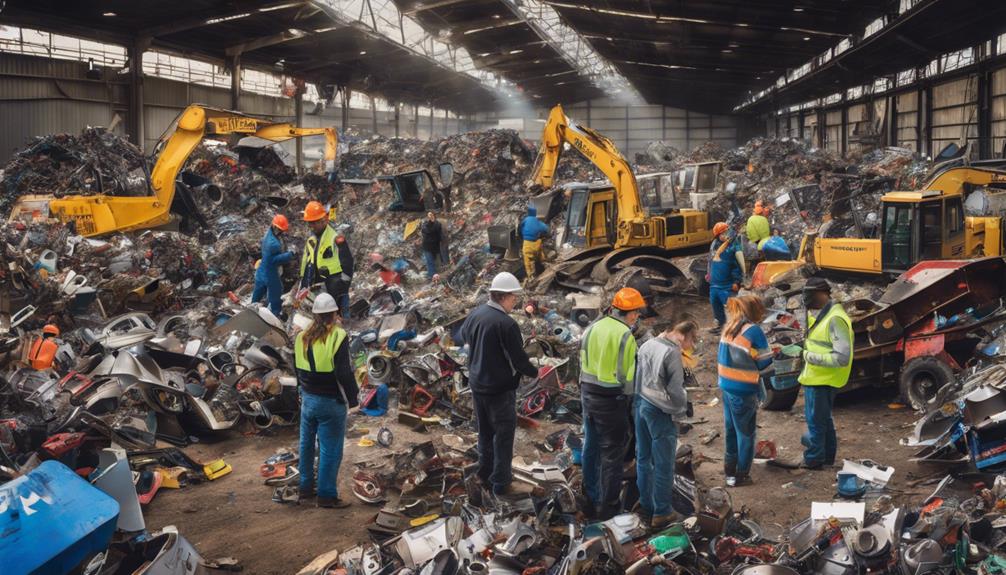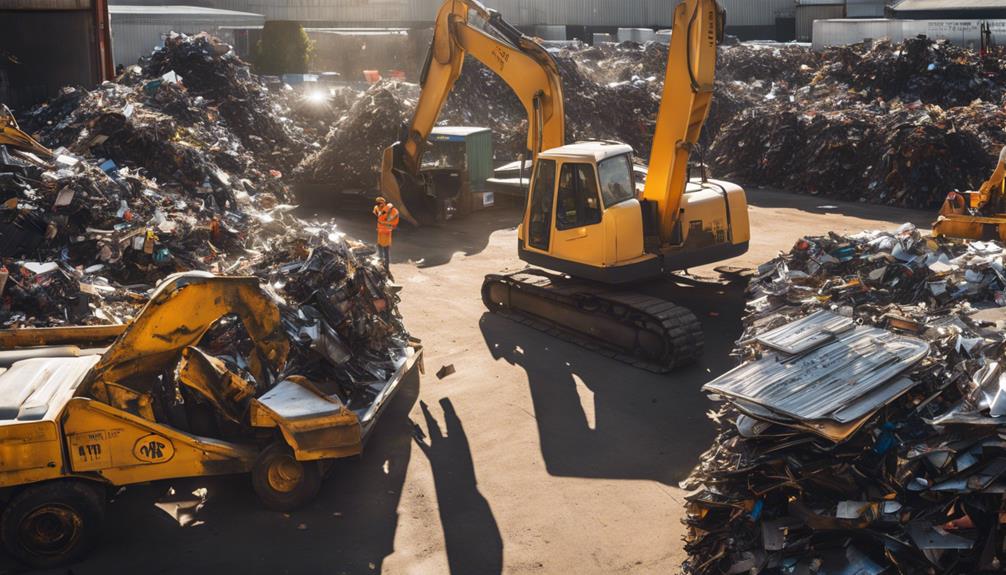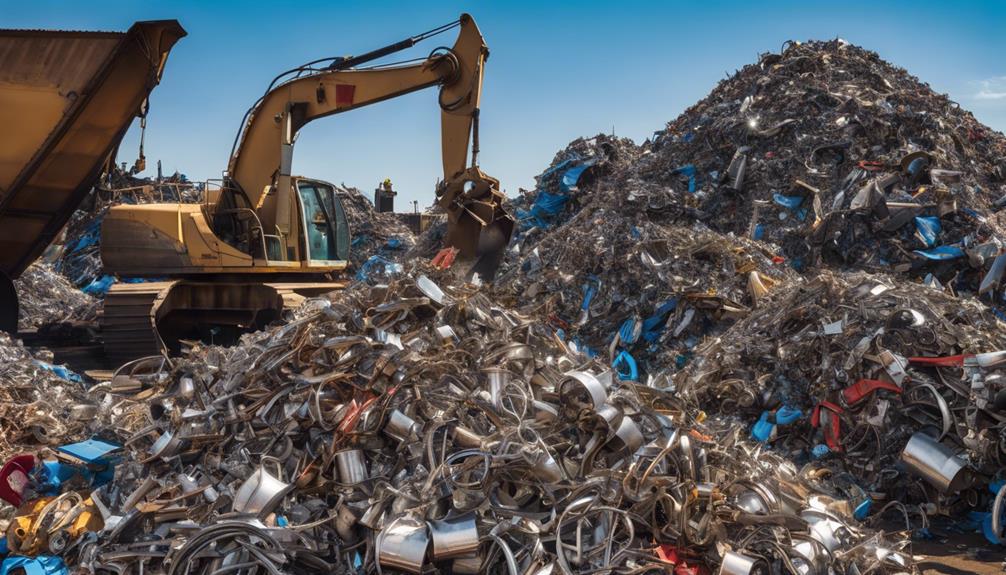If you're considering starting a scrap metal recycling business in Washington State, understanding the Scrap Metal Recycler Bond is essential. This bond not only ensures compliance with local regulations but also boosts your credibility among customers and partners. You'll need to navigate the application process, meet specific eligibility requirements, and factor in costs that can vary significantly. What happens if you fail to secure this bond or comply with regulations? The implications could be more serious than you think, leading to potential penalties that could impact your operations.
Overview of Scrap Metal Recycler Bond

Scrap metal recycler bonds are often essential for businesses in the recycling industry. These bonds serve as a guarantee that you'll comply with local laws and regulations while conducting your operations. By obtaining a scrap metal recycler bond, you demonstrate your commitment to ethical business practices, which can enhance your reputation in the market.
When you apply for this bond, you'll need to provide various details about your business, such as your financial history and operational practices. The bonding company assesses your credibility and risk before issuing the bond, which helps protect customers and the community from potential fraud or misconduct.
Typically, the bond amount required varies depending on your location and the specific regulations in place. It's vital to stay informed about these requirements, as they can change over time.
If you fail to comply with the regulations, your bond could be forfeited, which could lead to significant financial consequences for your business.
Importance of the Bond
In today's competitive recycling industry, having a scrap metal recycler bond is crucial for your business's success and credibility. This bond acts as a guarantee that you'll follow all local regulations and ethical practices.
When you have this bond, it signals to your clients, suppliers, and the community that you're a trustworthy operator committed to maintaining high standards.
Moreover, it protects you from potential financial losses caused by non-compliance or fraudulent activities. If someone were to suffer damages due to your negligence, the bond provides a financial safety net that can cover these claims, helping you avoid hefty fines or lawsuits. This assurance can significantly enhance your reputation in the market.
Additionally, many municipalities require this bond before issuing licenses for scrap metal recycling. By securing it, you ensure that you meet necessary legal requirements, allowing you to operate without interruptions.
Eligibility Requirements for Recyclers

Understanding the eligibility requirements for recyclers is essential for anyone looking to enter the scrap metal recycling industry. First, you need to ensure that you're operating within the legal framework of your state. This means obtaining the necessary licenses and permits specific to scrap metal recycling. Each state may have different regulations, so it's crucial to familiarize yourself with local laws.
Next, you'll want to establish a physical location for your recycling operations. This site must comply with zoning laws and environmental regulations. Additionally, you should demonstrate financial stability, as this shows your commitment to running a responsible business. Having a solid business plan can help in this regard.
You'll also need to maintain good standing with local authorities and avoid any criminal history related to theft or fraud. Insurers and bonding companies will look at your background during the bonding process, so it's best to be transparent.
Application Process for the Bond
To apply for a scrap metal recycler bond, you'll need to gather several key documents and information to streamline the process.
Start by collecting your business license, which proves that you're legally permitted to operate in your area. You'll also need to provide proof of your financial stability, such as bank statements or tax returns, to demonstrate your ability to meet any obligations that may arise.
Next, be prepared to submit your personal information, including your Social Security number and any relevant business ownership details. This information helps the surety company assess your risk level.
If applicable, include any additional documentation that shows your experience in the recycling industry, as it can strengthen your application.
Once you have all your documents, reach out to a surety bond provider who specializes in scrap metal recycler bonds. They'll guide you through the application process and help you understand any specific requirements they may have.
After you submit your application, the surety company will review your information and notify you of their decision, usually within a few days.
With everything in order, you'll be on your way to securing your bond.
Cost Factors for Obtaining the Bond

Several factors influence the cost of obtaining a scrap metal recycler bond. One key factor is your credit score. A higher credit score typically means lower premiums, as it indicates to the bond issuer that you're a lower risk.
On the other hand, if your credit score is low, you might face higher costs or even difficulty in securing the bond.
Another factor is the bond amount required by your state. Each state has different bonding requirements based on the volume of scrap metal you deal with. Generally, the higher the required bond amount, the higher your premium will be.
Additionally, the financial stability of your business plays a role. If your business has a solid financial history and a good reputation, you could benefit from reduced rates.
Conversely, if you're a new business or have a shaky financial record, expect to pay more.
Lastly, the bond provider you choose can impact the cost. Different providers may offer varying rates and terms, so it's wise to shop around for the best deal.
Bond Duration and Renewal
After securing your scrap metal recycler bond, it's important to consider how long the bond lasts and what the renewal process entails. Typically, these bonds have a duration of one year. This means you'll need to keep track of when your bond is set to expire, as maintaining continuous coverage is crucial for your business operations.
As the expiration date approaches, you'll want to start the renewal process well in advance. This usually involves contacting your bond provider to discuss any changes in your business circumstances that may affect your bond premium.
You might also need to undergo a review of your financial standing or business practices, especially if you've had claims against your bond in the past.
In many cases, the renewal process is straightforward, especially if you've maintained a good standing. However, be prepared to provide updated documentation or information if required.
Once you complete the renewal, you'll receive a new bond that continues to protect you and your clients. Staying proactive about your bond's duration and renewal helps ensure your operations run smoothly without any interruptions.
Compliance Regulations for Recyclers

Compliance regulations for recyclers play a crucial role in ensuring your business operates legally and ethically. You need to familiarize yourself with local, state, and federal laws that govern the recycling industry, including regulations related to debt consolidator bonds which help protect consumer interests. These regulations often include licensing requirements, operational practices, and record-keeping obligations.
First, ensure you have the necessary licenses to operate as a scrap metal recycler. This typically involves registering with the relevant authorities and meeting specific criteria. You'll also need to conduct due diligence on the materials you accept, verifying the identities of your suppliers to prevent the handling of stolen goods.
Next, implement proper record-keeping practices. You're usually required to maintain detailed records of all transactions, including the types and quantities of materials processed. This helps create transparency and supports compliance during inspections.
Additionally, stay updated on environmental regulations, as these can impact how you process and dispose of materials. Engaging in environmentally-friendly practices not only helps the planet but can also enhance your reputation in the community.
Consequences of Non-Compliance
Ignoring compliance regulations can lead to serious consequences for scrap metal recyclers. If you choose to overlook these rules, you risk hefty fines and penalties that can quickly add up. Regulatory authorities won't hesitate to take action if they find you're not following the necessary guidelines, putting your business in jeopardy.
Moreover, non-compliance can damage your reputation in the industry. Customers and partners may lose trust in your operations, leading to a decline in business opportunities. Once your credibility is compromised, it can be challenging to regain the confidence of clients and stakeholders.
In addition, non-compliance may result in the suspension or revocation of your operating license. This means you could be forced to halt your business activities until you rectify the issues, causing financial strain and potential job losses.
Lastly, if you find yourself facing legal actions due to non-compliance, the costs associated with legal fees and settlements can be overwhelming. It's crucial to stay informed and compliant with all regulations to avoid these serious repercussions that can threaten the viability of your scrap metal recycling business.
Benefits of Being Bonded

Being bonded offers significant advantages for scrap metal recyclers that can enhance your business's credibility and operational stability.
First and foremost, having a bond demonstrates your commitment to ethical practices and compliance with regulations, similar to the requirements for a WI Weight Reduction Center Bond. This can help you build trust with clients, suppliers, and the community, making it easier to attract and retain business.
Additionally, being bonded can provide you with a competitive edge in the marketplace. Many customers prefer to work with bonded recyclers, as it assures them that you're financially responsible and that their transactions are protected. This can lead to increased customer loyalty and potentially higher profits.
Moreover, a bond can act as a safety net for your business. In the event of unforeseen financial challenges or disputes, having a bond can provide security and reassurance to both you and your clients.
It can also safeguard your reputation, since being bonded often allows you to resolve issues more efficiently.
Resources for Scrap Metal Recyclers
For scrap metal recyclers, accessing the right resources can significantly enhance your operations and profitability. Start with local and national recycling associations. These organizations offer valuable information, networking opportunities, and advocacy for the industry. Joining them can keep you updated on best practices and regulations.
Next, consider online platforms that provide market trends and pricing. Websites like ScrapMonster or the Institute of Scrap Recycling Industries (ISRI) can help you stay informed about fluctuating metal prices and emerging market demands. This knowledge allows you to strategize your buying and selling effectively.
Training and certification programs are also essential. Look for workshops or online courses that focus on safety and efficient recycling techniques. These can improve your team's skills, leading to better operations and safety compliance.
Conclusion
In conclusion, obtaining a Scrap Metal Recycler Bond in Washington State is essential for your operation's success and compliance. It not only protects your business but also builds trust within your community. By understanding the eligibility requirements, application process, and costs involved, you can navigate the bonding process smoothly. Remember, staying compliant is key to avoiding penalties and enjoying the benefits of being bonded. So, take the necessary steps to secure your bond and thrive in the recycling industry!

